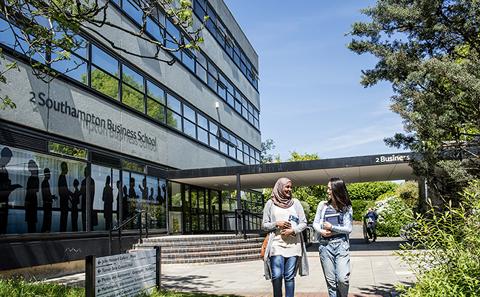Only one taught module must be taken (in year 1). Students must pass this module in order to proceed with their studies.
Semester 1
Compulsory
MANG7001 Qualitative and Quantitative Research Methods
In addition, following the training needs assessment, students are likely to be recommended to attend other modules and/or training programmes in the Business School or in other Schools, including the Graduate School. The rest of the programme is research-oriented,with students conducting original research under the guidance of their supervisors.
As a research student you will be directly enrolled on the PhD programme and your progress will be formally reviewed three times throughout the PhD candidature.
Minimum registration periods are two and three years respectively for the full-time and part-time candidatures. In practice you should expect to spend at least one more year of study than these minimum periods. All PhD students are required to attend a designated training course in quantitative and qualitative research methods in the first year of their PhD candidature. Passing such a training course is one of the compulsory requirements prior to the confirmation of the PhD status in year two (or three for part-time students) of the candidature. Depending on the topic of the research project, supervisors may recommend and ask that additional research training is attended in the University or elsewhere.
The Southampton Business School encourage students to seek constant feedback on their research work through presentation of their work at regular departmental seminars, School bi-annual PhD conference and prestigious national and international conferences. Each year a standard research allowance is made available to all students to support their field work and attendance of conferences. An additional conference research fund is available throughout the year to cover the costs of very expensive conferences; allocation of the funding is made on a competitive basis provided specific merit criteria are met. Students are also encouraged to submit papers to top-ranked peer reviewed journals for publication. Should their papers be accepted for publication students are rewarded with additional research funding.
Typical key stages for full-time PhD candidature
Year 1
- By the end of month 3 of commencing the programme, research students should have completed their training needs analysis, begun participation in relevant research seminars offered by the Southampton Business School (SBS), and confirmed the full supervisory team
- Students will also need to have sat MANG7001 (the training course in quantitative and qualitative research methods), the only compulsory module in the PhD Programme, assessed 100% by coursework and a successfully pass is a pre-requisite for confirmation of the PhD candidature in Year 2 (pro-rata for part-time students)
- Students are expected to have passed the first formal progression review between months 8 and 10 of the PhD candidature (pro-rata for part-time students). The formal progression review involves a Viva with an independent assessor and the leading supervisor. Should this fail only one more attempt is allowed before the end of month 12 (pro-rata for part-time students)
- The assessment of the second attempt of the first progression review will lead to one of the following recommendations:
- to progress to the next stage of candidature;
- to terminate the student's candidature.
- Students are required to complete 3 monthly activity reports on a regular basis. Failure to comply with such requirement results in the breach of the University regulations.
Year 2
- Independent study and research, research seminars, attendance of conferences, presenting papers at relevant doctoral colloquiums and academic conferences, and regular supervision meetings continue throughout the second year.
- Data collection and analysis is expected to be undertaken to an adequate extent.
- Between 18–21 months of the candidature (pro-rata for part-time students) the candidate is required to submit a mini-thesis for the second formal progression review (also called ‘confirmation’ of the PhD status).
- A viva voce takes place in the second formal progression review with two independent assessors. Students must demonstrate they have the potential to undertake independent research and produce a doctoral level thesis within the timescale of the programme. Should the first attempt fail a second attempt is allowed before the end of month 24 of the PhD candidature (pro-rata for part-time students).
- In order for the PhD status to be confirmed, the following criteria must be met:
- that the research student has demonstrated the ability to manage the research project, to become proficient in the special field of research involved, and to achieve success at PhD level given adequate motivation and perseverance
- that the project being undertaken is of sufficient scope, originality and theoretical interest to constitute a genuine contribution to the subject in the form of the understanding of a problem, the advancement of knowledge or the generation of new ideas.
- The second formal progression review (confirmation) will also conduct the academic needs analysis. By the date of the second formal progression review, the candidate is required to have completed the Ethics 1 module (online) and pass MANG7001.
- The second Confirmation panel may make one of three recommendations
- the PhD candidature is confirmed
- the research student is transferred to an MPhil programme
- the research student's candidature is terminated.
- In year 2 students are required to complete the three monthly activity reports on a regularly basis.
Year 3
- Evidence of continued progress is provided by publications and presentations in a suitable venue (e.g. an international conference).
- Students are expected to complete all empirical work and write up of the thesis
- The target date for submission of the thesis is the end of year 3 (pro-rata for part-time students)
- Between months 30 and 33 of the PhD candidature (pro-rata for part-time students) there will be a formal progression review meeting which involves a Viva, based on the research student's written submission (first full draft of the PhD thesis). It will also include a review of the academic needs analysis.
- Should the first attempt of the third formal progression review fail, a second attempt is allowed between the end of month 36 (pro-rata for part-time students)
- The third progression review will lead to one of the following recommendations:
- to progress to the final stage of candidature
- to transfer to MPhil candidature
- to terminate the student's candidature
- In year 3 students are required to complete the three monthly activity reports on a regularly basis.
Year 4
- Final thesis must be submitted at the latest by the end of the 48th month of the PhD candidature (pro-rata for part-time students)
- Final examination of the thesis via Viva takes place. Potential outcomes will be:
- award of the PhD
- award of the PhD subject to minor corrections to the thesis
- major revision of the thesis with the award of the PhD subject to a further examination
- rejection of the thesis and no award of the PhD. In this case an MPhil may be awarded based on earlier performance.
Supervisory arrangements
Your supervisor team will be made up of at least one main supervisor and a co-supervisor. At least one member of the supervisory team will have supervised other research students to successful completion. The main supervisor is responsible for the day-to-day supervision of your progress and specific academic guidance on the topic, direction of research and the structure of the thesis. The remaining members of your supervisory team, including your co-supervisor, are chosen in consultation with the main supervisor as having interests and expertise relevant to the topic of your research. Where appropriate they may be drawn from other schools.
Please also refer to academic profiles for identifying prospective supervisors whose areas of research interest match yours.


